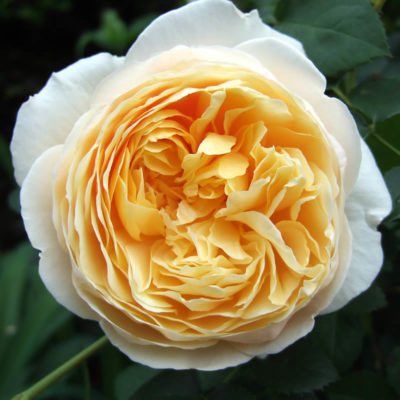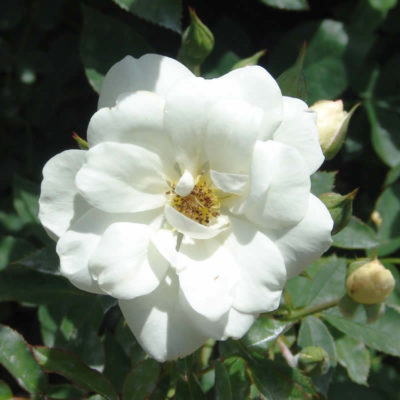Learning to love Roses… well, … like them at least

Prospective clients often say to me “please don’t give me any roses – they’re too much hard work”, or “no, definitely not roses – they get too many diseases”, etc etc… These clients often remember their parents and grandparents spending many an hour spraying their rose gardens and complaining bitterly about the problems of rust, mildew, black spot, aphids and the like.
It’s fair to say that for a decade or two, roses had a very bad press.
Justified or not?
To some degree the reputation of roses being difficult is justified – they are prone to a variety of pests and diseases (although modern varieties tend to be more resistant), won’t thrive in shallow soils over chalk, and when grown en masse in a rose garden can look very bleak and bare through the long winter months.
But grown in small groups of the same variety within mixed borders (rather than in formal rose gardens), as summer flowering shrubs they are deservedly making something of a comeback. They have a really long flowering season – starting in June, many will flower in flushes all summer and autumn long, and you may even have the odd plant with a few flowers at Christmas in these milder times. Not many plants work this long and hard!
They also hold their leaves late. Many varieties have the added attraction of being deliciously scented. And of course, they have a wide variety of flower colours – both garish and uber subtle. They come in a huge variety of sizes – making them suitable for all parts of the border, except shady canopies under trees.
They absolutely thrive in heavy clay soils, and, as they have a deep root run, are extremely drought tolerant (although they do tend to stop producing flowers during periods of extreme summer drought). Yes, they will benefit from a feed and a preventive spray in the spring and during the summer months, but they won’t keel over without this TLC.
My favourites?
I do have a few favourite varieties – ALDA clients will recognise these as I tend to use them a lot in my designs because I like them so much:
Sweet Juliet – a tallish David Austin shrub rose with very pale apricot pink flowers, and the most wonderful fragrance; long flowering and still in flower in my garden as I write this.
Kent – one of the disease resistant County Series roses. A neat low but upright growing ground cover rose with white flowers. This plant mixes well with clipped Box and slightly later Alliums, and other white and mauve flowers in “traditional meets contemporary” themes.
Wiltshire – another County series rose, this time with deep pink flowers. Tolerant of a wide range of conditions, and will grow happily in a raised bed in more chalky areas.
Climbing Iceberg – a really reliable white climbing rose, very free flowering.
Little Rambler – a small pinky-white, sweetly scented rose. Flowers all summer.
Charlotte – another David Austin shrub rose. Tough, long flowering, pale yellow rose. Copes with being baked against my conservatory wall!
And there are many more…..
Mixing it up
Roses mix well with other plants – other shrubs e.g. silver variegated evergreen Pittosporums in taller schemes, Clematis up pergolas and arches, or with a lush lower level tapestry around them – think plants such as Lavender, Geraniums etc.
Expert Tip: if you are growing them with lots of other summer flowering deciduous shrubs and perennials, anchor the scheme with a bit of low level structure in the form of clipped Box or Euonymus or Pittosporum Tom Thumb or similar.
Now is a great time to buy and plant roses (provided the ground isn’t waterlogged or frozen). So, go on, give them a try. Cos they’re worth it!
Image Credits: Nesster, k yamada, Drew Avery


